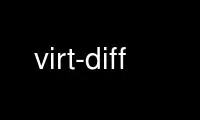
This is the command virt-diff that can be run in the OnWorks free hosting provider using one of our multiple free online workstations such as Ubuntu Online, Fedora Online, Windows online emulator or MAC OS online emulator
PROGRAM:
NAME
virt-diff - Differences between files in two virtual machines
SYNOPSIS
virt-diff [--options] -d domain1 -D domain2
virt-diff [--options] -a disk1.img [-a ...] -A disk2.img [-A ...]
DESCRIPTION
"virt-diff" lists the differences between files in two virtual machines or disk images.
The usual use case is to show the changes in a VM after it has been running for a while,
by taking a snapshot, running the VM, and then using this tool to show what changed
between the new VM state and the old snapshot.
This tool will find differences in filenames, file sizes, checksums, extended attributes,
file content and more from a virtual machine or disk image. However it does not look at
the boot loader, unused space between partitions or within filesystems, "hidden" sectors
and so on. In other words, it is not a security or forensics tool.
To specify two guests, you have to use the -a or -d option(s) for the first guest, and the
-A or -D option(s) for the second guest. The common case is:
virt-diff -a old.img -A new.img
or using names known to libvirt:
virt-diff -d oldguest -D newguest
OPTIONS
--help
Display brief help.
-a file
--add file
Add file which should be a disk image from the first virtual machine. If the virtual
machine has multiple block devices, you must supply all of them with separate -a
options.
The format of the disk image is auto-detected. To override this and force a
particular format use the --format=.. option.
-a URI
--add URI
Add a remote disk. See "ADDING REMOTE STORAGE" in guestfish(1).
--all
Same as --extra-stats --times --uids --xattrs.
--atime
The default is to ignore changes in file access times, since those are unlikely to be
interesting. Using this flag shows atime differences as well.
-A file
-A URI
Add a disk image from the second virtual machine.
--checksum
--checksum=crc|md5|sha1|sha224|sha256|sha384|sha512
Use a checksum over file contents to detect when regular files have changed content.
With no argument, this defaults to using md5. Using an argument, you can select the
checksum type to use. If the flag is omitted then file times and size are used to
determine if a file has changed.
-c URI
--connect URI
If using libvirt, connect to the given URI. If omitted, then we connect to the
default libvirt hypervisor.
If you specify guest block devices directly (-a), then libvirt is not used at all.
--csv
Write out the results in CSV format (comma-separated values). This format can be
imported easily into databases and spreadsheets, but read "NOTE ABOUT CSV FORMAT"
below.
--dir-links
The default is to ignore changed in the number of links in directory entries, since
those are unlikely to be interesting. Using this flag shows changes to the nlink
field of directories.
--dir-times
The default is to ignore changed times on directory entries, since those are unlikely
to be interesting. Using this flag shows changes to the time fields of directories.
-d guest
--domain guest
Add all the disks from the named libvirt guest, as the first guest. Domain UUIDs can
be used instead of names.
-D guest
Add all the disks from the named libvirt guest, as the second guest. Domain UUIDs can
be used instead of names.
--echo-keys
When prompting for keys and passphrases, virt-diff normally turns echoing off so you
cannot see what you are typing. If you are not worried about Tempest attacks and
there is no one else in the room you can specify this flag to see what you are typing.
--extra-stats
Display extra stats.
--format=raw|qcow2|..
--format
The default for the -a/-A option is to auto-detect the format of the disk image.
Using this forces the disk format for -a/-A options which follow on the command line.
Using --format with no argument switches back to auto-detection for subsequent -a/-A
options.
For example:
virt-diff --format=raw -a disk.img [...]
forces raw format (no auto-detection) for disk.img.
virt-diff --format=raw -a disk.img --format -a another.img [...]
forces raw format (no auto-detection) for disk.img and reverts to auto-detection for
another.img.
If you have untrusted raw-format guest disk images, you should use this option to
specify the disk format. This avoids a possible security problem with malicious
guests (CVE-2010-3851).
-h
--human-readable
Display file sizes in human-readable format.
--keys-from-stdin
Read key or passphrase parameters from stdin. The default is to try to read
passphrases from the user by opening /dev/tty.
--times
Display time fields.
--time-days
Display time fields as days before now (negative if in the future).
Note that 0 in output means "up to 1 day before now", or that the age of the file is
between 0 and 86399 seconds.
--time-relative
Display time fields as seconds before now (negative if in the future).
--time-t
Display time fields as seconds since the Unix epoch.
--uids
Display UID and GID fields.
-v
--verbose
Enable verbose messages for debugging.
-V
--version
Display version number and exit.
-x Enable tracing of libguestfs API calls.
--xattrs
Display extended attributes.
NOTE ABOUT CSV FORMAT
Comma-separated values (CSV) is a deceptive format. It seems like it should be easy to
parse, but it is definitely not easy to parse.
Myth: Just split fields at commas. Reality: This does not work reliably. This example
has two columns:
"foo,bar",baz
Myth: Read the file one line at a time. Reality: This does not work reliably. This
example has one row:
"foo
bar",baz
For shell scripts, use "csvtool" (http://merjis.com/developers/csv also packaged in major
Linux distributions).
For other languages, use a CSV processing library (eg. "Text::CSV" for Perl or Python's
built-in csv library).
Most spreadsheets and databases can import CSV directly.
EXIT STATUS
This program returns 0 if successful, or non-zero if there was an error.
Use virt-diff online using onworks.net services
